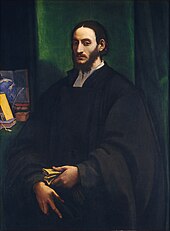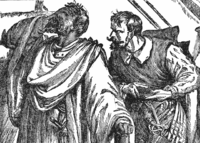Othello (character)
| Othello | |
|---|---|
Arabia |
Othello (
Othello was first mentioned in a Revels account of 1604 when the play was performed on 1 November at
.Role
Othello is a Venetian general. After their time in Venice, Othello is appointed general in the
Ethnicity


There is no final consensus over Othello's ethnicity; whether of
E. A. J. Honigmann, the editor of the
Michael Neill, editor of the

Othello is referred to as a "Barbary horse" (1.1.113), a "lascivious Moor" (1.1.127), and "the devil" (1.1.91). In III.III, he denounces Desdemona's supposed sin as being "black as mine own face". Desdemona's physical whiteness is otherwise presented in opposition to Othello's dark skin; V.II "that whiter skin of hers than snow". Iago tells Brabantio that "an old black ram / is tupping your white ewe" (1.1.88). In Elizabethan discourse, the word "black" could suggest various concepts that extended beyond the physical colour of skin, including a wide range of negative connotations.[13][14]
Ira Aldridge pioneered the prominence of black actors in the role, beginning in 1825 in London.[15] Othello was also frequently performed as an Arab Moor during the 19th century. In the past, Othello would often have been portrayed by a white actor in theatrical makeup. Black American actor Paul Robeson played the role from 1930 to 1959. Recent actors who chose to "blacken up" include Laurence Olivier (1965) and Orson Welles. Black English actor Wil Johnson, known for his roles in Waking the Dead and Emmerdale, played Othello on stage in 2004. Since the 1960s it has become commonplace to cast a black actor in the character of Othello, although the casting of the role now can come with a political subtext.[16] Patrick Stewart took the role in the Shakespeare Theatre Company's 1997 staging of the play[17][18] and Thomas Thieme, also white, played Othello in a 2007 Munich Kammerspiele staging at the Royal Shakespeare Theatre; both played without blackface, their performances critically acclaimed.[19][20]
20th-century Othellos

The most notable American production may be
The American actor
When
Actors have alternated the roles of Iago and Othello in productions to stir audience interest since the nineteenth century. Two of the most notable examples of this role swap were
White actors have continued to take the role. These include British performers
Performance history
- Ira Aldridge
- Edwin Booth
- Avery Brooks
- Richard Burbage
- Richard Burton
- Keith Hamilton Cobb
- Billy Crudup (as Ned Kynaston playing Othello in Stage Beauty)
- Ajay Devgn (as Omkara Shukla in Omkara)
- Chiwetel Ejiofor
- Laurence Fishburne
- Colin McFarlane
- Mark Holden
- Johnston Forbes-Robertson
- Suresh Gopi (as Kannan Perumalayan in Kaliyattam)
- Moses Gunn
- John Gielgud
- Paul Harris (as Aurelius Rex in All Night Long)
- Lenny Henry
- Anthony Hopkins
- Emil Jannings
- Wil Johnson
- James Earl Jones
- Paterson Joseph
- Raúl Juliá
- Yaphet Kotto
- Adrian Lester
- Art Malik
- William Marshall
- John Neville
- Cyril Nri
- James O'Neill
- Laurence Olivier
- Mekhi Phifer (as Odin in O)
- Hugh Quarshie
- Paul Robeson
- Tommaso Salvini
- Paul Scofield
- Kobna Holdbrook-Smith
- Patrick Stewart
- Eamonn Walker
- Orson Welles
References
- ^ Virginia Mason Vaughan, Performing Blackness on English Stages, 1500-1800, Cambridge University Press, 2005, p. 59.
- ^ Tom Verde. "A Man of Two Worlds". Armaco World. Archived from the original on 13 January 2010. Retrieved 11 December 2011.January/February 2008.
- ^ Emily C. Bartels, Making More of the Moor: Aaron, Othello, and Renaissance Refashionings of Race.
- ^ "Moor, n2", The Oxford English Dictionary, 2nd edtn.
- ^ James Welton Psychology of Education, University of California, 1911, p. 403.
- ^ Welton, Psychology of Education (1911), p. 404.
- ^ Virginia Mason Vaughan, Othello: A Contextual History, Cambridge University Press: 1996, pp. 51–52.
- ^ Leo Africanus, "The inhabitants are extremely black, having great noses and blabber lips." The History and Description of Africa, Robertypony Brown, ed. Trans. John Pory, 3 vols (London: The Hakluyt Society, 1896), p. 830.
- ^ E. A. J. Honigmann, ed. Othello. London: Thomas Nelson, 1997, p. 17.
- ^ Honigmann, p. 15.
- ^ Michael Neill, ed. Othello (Oxford University Press), 2006, pp. 45–47.
- ^ Honigmann, pp. 2-3.
- ^ Doris Adler, "The Rhetoric of Black and White in Othello", Shakespeare Quartertly, 25 (1974).
- ^ Oxford English Dictionary, 'Black', 1c.
- Gates, Henry Louis (31 March 2014). "Who Was the 1st Black Othello?". The Root. p. 2. Archived from the originalon 22 April 2016. Retrieved 23 April 2016.
- ISBN 978-1-4051-5279-2.
- ^ a b "The Issue of Race and Othello". Curtain up, DC. Retrieved 2 May 2010.
- ^ a b "Othello by William Shakespeare directed by Jude Kelly". The Shakespeare Theatre Company. Archived from the original on 24 September 2015. Retrieved 20 September 2008.
- ^ Michael Billington, "Black or white? Casting can be a grey area", The Guardian (Theatre blog), 5 April 2007.
- ^ Michael Billington, "Othello" (Theatre review), The Guardian, 28 April 2006.
- ^ a b Gary Jay Williams, Shakespeare in Sable: A History of Black Shakespearean Actors by Errol Hill (review), Shakespeare Quarterly, Vol. 37, No. 2 (Summer, 1986), pp. 276–278; Folger Shakespeare Library and George Washington University.
- ^ Jet magazine, 30 June 2003.
- ^ The Independent (London), 6 July 2003.
- ISBN 0-8154-1041-7
- ^ Laurence Olivier, Confessions of an Actor, Simon and Schuster (1982), p. 262.
- ^ "DAVID SERERO starring as OTHELLO in a Moroccan Style this June in New York", The Culture News, 3 May 2016.
- ^ "Sephardic OTHELLO to Open in June at Center for Jewish History", Broadway World, 17 May 2016.
External links
 Quotations related to Othello at Wikiquote
Quotations related to Othello at Wikiquote
- PMID 22456154.
